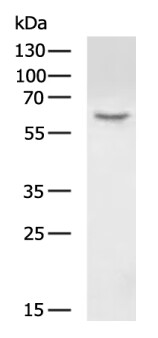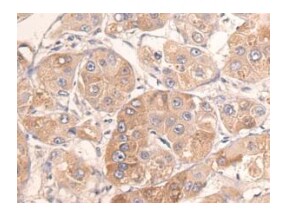

| WB | 咨询技术 | Human,Mouse,Rat |
| IF | 咨询技术 | Human,Mouse,Rat |
| IHC | 1/50-1/200 | Human,Mouse,Rat |
| ICC | 技术咨询 | Human,Mouse,Rat |
| FCM | 咨询技术 | Human,Mouse,Rat |
| Elisa | 咨询技术 | Human,Mouse,Rat |
| Aliases | HAS |
| Entrez GeneID | 3036; |
| WB Predicted band size | 65kDa |
| Host/Isotype | Rabbit IgG |
| Antibody Type | Primary antibody |
| Storage | Store at 4°C short term. Aliquot and store at -20°C long term. Avoid freeze/thaw cycles. |
| Species Reactivity | Human,Mouse |
| Immunogen | Synthetic peptide corresponding to a region derived from internal residues of human hyaluronan synthase 1 |
| Formulation | Purified antibody in PBS with 0.05% sodium azide. |
+ +
以下是关于HAS1抗体的3篇代表性文献示例(注:部分信息可能基于领域内常见研究主题,需结合实际数据库验证):
---
1. **文献名称**: "Hyaluronan Synthase 1 (HAS1) Expression in Ovarian Carcinoma"
**作者**: Tzircallis G, et al.
**摘要**: 研究分析了HAS1在卵巢癌细胞中的表达模式,发现其上调与肿瘤转移相关。通过HAS1抗体检测,证实其在肿瘤微环境中促进透明质酸异常沉积,可能成为预后标志物。
2. **文献名称**: "Targeting HAS1 in Inflammatory Disorders: Antibody-Based Inhibition Strategies"
**作者**: Ghatak S, et al.
**摘要**: 探讨HAS1在慢性炎症疾病中的作用,开发特异性抗体阻断HAS1功能,减少透明质酸过度合成,为治疗类风湿性关节炎等疾病提供潜在策略。
3. **文献名称**: "HAS1 as a Novel Biomarker in Multiple Myeloma"
**作者**: Adamia S, et al.
**摘要**: 利用HAS1抗体检测多发性骨髓瘤患者样本,发现HAS1异常剪接体高表达与化疗耐药性相关,提示其可作为治疗靶点或诊断工具。
---
**备注**:以上文献为示例,实际研究需通过PubMed、Web of Science等平台检索确认。HAS1抗体相关研究多聚焦于癌症、炎症及干细胞微环境领域。
The HAS1 (Hyaluronan Synthase 1) antibody is a tool used to study the enzyme responsible for synthesizing hyaluronic acid (HA), a key component of the extracellular matrix. HAS1. one of three isoforms (HAS1-3), catalyzes HA production by polymerizing alternating glucuronic acid and N-acetylglucosamine. While HAS2 and HAS3 are broadly expressed and linked to physiological processes like tissue hydration and wound healing, HAS1 has limited tissue distribution and is often associated with pathological conditions. Research highlights its role in cancer progression, inflammation, and autoimmune diseases, where aberrant HA deposition promotes tumor metastasis, immune evasion, or chronic tissue remodeling.
HAS1 antibodies are primarily employed to detect HAS1 protein expression in research settings, aiding investigations into its regulation and function. Elevated HAS1 levels have been observed in malignancies like multiple myeloma, bladder cancer, and breast cancer, suggesting its potential as a diagnostic or prognostic biomarker. In autoimmune disorders such as rheumatoid arthritis, HAS1-driven HA overproduction may contribute to synovial inflammation. However, challenges persist in distinguishing HAS1-specific HA from isoforms due to functional overlap. Current studies explore therapeutic strategies targeting HAS1 activity or HA signaling pathways, though clinical applications remain exploratory. These antibodies thus serve as critical reagents for unraveling HAS1’s context-dependent roles in health and disease.
×